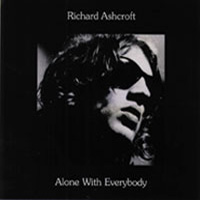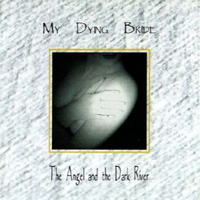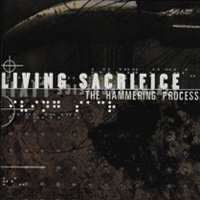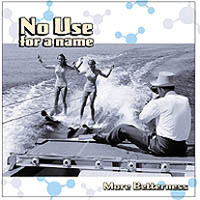 No Use For A Name
No Use For A Name
More Betterness! (Fat)
An interview with guitarist/vocalist Tony Sly
by Tim Den
After churning out some damn fine pop punk for a decade (or more), No Use For A Name have put out yet another brilliant record. Heartbreaking melodies as the central focus, More Betterness!(Fat) sees the band take a more laidback approach to their usual brand of adrenalized pop. Ever-important to the punk genre as preachers of songwriting in its purest form (along with fellow label mates Lagwagon), No Use For A Name will always be one heartache ahead of the rest. Guitarist and vocalist Tony Sly shares his tales via cell phone from his home in Cali, moments before leaving for the European Fat Wreck tour.
I’m going to start with the obvious: What happened with Chris (Shiflett, guitar and backup vocals)?
He joined the Foo Fighters. He called me about five weeks ago, right before our US tour started… ten days before the US tour. He said “Look, I got an offer from the Foo Fighters to play, I’m gonna take it. Hope there’re no hard feelings.”
How’d you guys take it?
Well, there weren’t any hard feelings because we saw it as a good opportunity for him. We’re still good friends. Plus, he didn’t write anything for the band. I mean, it was a huge loss as a friend, but at the end of the day, we got a guitar player two days later. He (the new guitar player) came in, knew the songs right away, and it was really easy for him and us to adjust.
Who’s Chris’ replacement?
His name is Dave Nassie. He played with Suicidal Tendencies for a while, and with Infectious Grooves, too.
I bet you’ve been getting a lot questions about Chris…
Yeah. But it’s okay; you gotta expect that because it’s looked at as a big deal. I mean, he joined the Foo Fighters.
I’m assuming the decision had something to do with financial matters…
Yeah, I’d imagine that’s what it was. But Foo Fighters are his favorite band anyway.
So how long are you guys going to Europe for?
Five weeks.
Who are you going with?
We’re headlining the Fat Wreck tour over there with Tilt, Snuff, Mad Caddies, and Consumed.
Has the new record been released over there?
It came out in the States Oct. 5th. I assume it came out there earlier.
It’s a lot more laidback than your earlier releases.
It is. It was a natural progression for us. We didn’t think about it too hard, consciously trying to make an album that was more mellow. I think it’s just sort of where we’re at right now. But our next record could be totally fast punk or whatever. It depends on what the vibe is once you get into the rehearsals.
And you do most of the writing?
Yes.
Do you think recent events – or records – caused you to write mellower material?
I was listening to slower music when writing this record. I was digging back… because I don’t think too many good records have come out lately, especially in ’98. I started listening to older stuff like The Beach Boys, things like that. A lot of The Beatles, stuff from the ’60s and ’70s.
I know you and Rory (Koff, drummer) both worship The Beatles. They’re my favorite band, so we have something to chat about.
Right on.
What’re your favorite records by them?
I like the middle of their career: mid-’60s. My three favorites are right in a row: Rubber Soul, Revolver, Sgt. Pepper’s Lonely Hearts Club Band. I mean, I love all of their stuff. In the beginning, they were writing simple pop songs, and in the end, they were writing simple rock songs. But in the middle, they were doing everything between the two. It made the four or five albums in between great.
I think they returned to simple rock by the end because they realized “Hey, we’ve done everything else possible!”
That’s totally true. They rediscovered their roots. But even as they were “rediscovering” good ol’ rock’n’roll, they still did really strange and weird things that made the songs unique.
Do you listen to Elliott Smith at all?
Not as much as I listen to Radiohead. To me, OK Computer is pretty much the be-all, end-all record. I can’t listen to anything else afterwards.
I think those artists (Radiohead, Elliott Smith) are inspired by that time (’60s).
Definitely. The whole British scene – I know Elliott Smith isn’t British – bands like Radiohead and Supergrass, you can’t deny the influence.
That’s funny because I interviewed Joey Cape from Lagwagon, and he was talking about Jellyfish. I’ve noticed a few SoCal pop punk bands are diving into just plain ol’ pop…
It’s totally true. We’ve been on tour with Lagwagon, and comparing my CD collection with Joey’s, we pretty much like the same stuff.
I think the kids who only listen to punk or hardcore (or melodic hardcore, or whatever sub-genre name is trendy this week) don’t realize that, in the end, bands like you and Lagwagon are writing good pop songs, no matter how fast the tempo or how heavy the guitars are. Many bands rely a lot on either “punkness” or “heaviness,” playing riffs and not actual songs, instead of breaking down the songs and realizing the melodic tendencies within. The last Lagwagon record was beyond that, and I have to say the same thing about Making Friends (the NUFAN release before More Betterness!).
This new one and Making Friends were definitely the first records for us that didn’t concentrate so much on riffs. The older stuff had a lot of almost thrashy guitars. I tend to spend more time on the melodies now. It’s probably because everything on Making Friends and the new one was written acoustically. A lot of them were slow, acoustic songs first, then we put a fast drum beat to it.
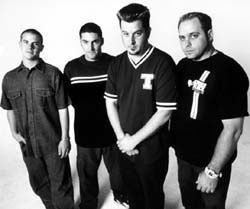 That’s exactly what Joey said.
That’s exactly what Joey said.
It’s pretty common.
Do you think having Matt (Riddle, bass and backup vocals) in the band has contributed to that in any way? He used to write for Face To Face when he was with them, and they were very concentrated on vocal melodies.
It helps with the arrangement aspect. He doesn’t write as much in this band. His writing style is just really different. Also, he doesn’t write lyrics or melodies. He’s more like the “music” guy. So the stuff that he puts together for us is basically music. Having him in the band hasn’t changed the writing too much. The reason he wrote when he was with Face To Face was because Trevor (Keith) didn’t write enough songs. But since I write all the time – and I really do write all the time – there are plenty of songs. He says it’s kind of nice that he doesn’t have to worry about writing all the songs.
Do you guys have to deal with living in Face To Face’s shadow?
Matt does. Every once in a while, people talk to him about Face To Face. But the good thing is, a lot of people didn’t like the two records after he left the band. So in that respect, it’s okay.
I saw you down in Florida, and Matt got very upset when someone yelled out “Face To Face!”
It was probably because he’d had one of those weeks where someone mentioned it to him everyday. He had a weird relationship with those guys, you know… And it was pretty much a bitter break-up. As far as I know, they haven’t talked since. I think he’s more bummed because he was friends with Trevor for twelve years, and then all of a sudden, it was boom, “you’re out of the band.”
He was kicked out? I was told he quit.
I think it was a mutual decision. They were fighting so much and they had trouble touring together. Matt was already thinking about quitting when they called him in and told him “you’re not in the band anymore.” In a sense, he was kicked out, but it was time for him to go.
Back to the rock n’ roll talk… There’s definitely been a backlash against pop punk in the last few years, and I don’t know how you feel, but I think it’s unfair. The masses are dismissing the genre because they’ve stereotyped it as silly, fast music, when they should be taking the time to listen to its soul: the melodies.
A lot of kids these days don’t want to hear something that’s going to take a lot of time for them to get into, something that’s really deep. They want the beat, the yelling, and the quick fix.
At the same time, some are flocking to the other extreme: art/weird rock. But they’re attracted to it not because they understand the “artistic” values, but because it makes them “different,” “deeper,” and “more mature” than their school friends. Plus, most of the bands in those genres don’t seem to care about good songs.
That’s true. You have to have something coming from your heart if you’re gonna kick out a good melody. When we get “weird,” it just happens. We rarely try to be weird. I mean, what’s weird anyway? Everything’s been done. It’s useless to try and prove uniqueness by shooting for just plain “weird.” It shouldn’t be done if it sacrifices the music.
I wish rock fans would lose their stereotypes and find the real substance behind pop punk. For example, there’re cellos and strings on your new record.
It’s a different step for us, but it seems a lot of bands are doing that these days. People have been writing in to the message board on our website saying “I’ve been a fan since Daily Grind” or whatever, and go on to say how great the direction we’re going in is. A lot of “keep up the good work” mail. So I think this was a good time to release a record like More Betterness!.
Do you ever get tired of defending pop punk and just want to give it up for a genre that, guessing from your influences, you’ve been drawing all your influences from anyway?
I do that on a personal level. I write a lot of songs that don’t sound like No Use For A Name, and I do a lot of stuff on my eight-track with keyboards and piano. Acoustic guitar, drum machine… so in a sense, I do do that. But I never think about doing stuff like that for No Use For A Name. We believe that No Use For A Name is an edgy band. When we play live, we like to perform. We’ll never play a song like “Let it Slide” live because it’s an acoustic song with strings. We like our shows to be a blast, everybody going off. If we wrote an album full of slow songs, it wouldn’t be a good idea. But throwing the occasional acoustic song onto your album is not such a big deal. It doesn’t mean we’re gonna bust it out live and put people through that.
It makes the record more dynamic…
Like they were in the late ’60s. But a lot of albums today, especially on major labels, are like the ones released in the late ’50s/early ’60s where you have the single and the rest of the album is crap. It all sounds like the single. I’ve always thought it was about making a solid record. Forget looking for one or two songs to carry the album, we hate that. We’d like to think that every song is its own thing, and that the whole thing collectively makes it a good record.
(PO Box 193690 San Francisco, CA 94119)

